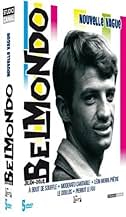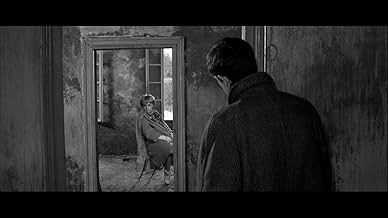IMDb RATING
6.9/10
1.4K
YOUR RATING
A wealthy, bored woman witnesses a murder in affection and meets another witness. She asks him about the history of the victim and falls in love with him.A wealthy, bored woman witnesses a murder in affection and meets another witness. She asks him about the history of the victim and falls in love with him.A wealthy, bored woman witnesses a murder in affection and meets another witness. She asks him about the history of the victim and falls in love with him.
- Awards
- 1 win & 1 nomination total
Featured reviews
the atmosphere. the Duras mark. the mark of Peter Brooks. and the performances. a Belmondo who conquest a special status, exploring a role who has the force of nuances. Jeanne Moreau - the same and different. the piano's lessons. and the city. a film about solitude in a honest, cruel manner. slices from Madame Bovary. and the search of sense in the presence of the other. the mixture of temptation and fear, expectation and sin, the form of illusion and the brutal end does it a gem. not only for the artistic virtues but for a special manner to use the novel for the portrait of a small world. a film of music as piece from silhouettes, dialogs and fall. a not real comfortable film. but useful.
"Moderato Cantibile" was only the second film by the great British director Peter Brook and it proved, like Welles before him, that he was equally adept in either medium. It was made in France in 1960 and has now largely been forgotten, though at the time the magazine Films and Filming selected it as the best film of the year from any source and it's a masterpiece. It's also one of the most beautiful black and white films to be made in the Cinemascope format. (Armand Thirard was the DOP).
It's about a respectable,if unhappily married, woman in a grim little coastal town in France who drifts into an affair of sorts with a man from farther down the social ladder. They are played, magnificently, by Jeanne Moreau and Jean-Paul Belmondo. The oblique, brilliant screenplay is by Marguerite Duras and Gerard Jarlot from a novel by Duras and anyone remotely interested in cinema as an art-form should seek it out.
It's about a respectable,if unhappily married, woman in a grim little coastal town in France who drifts into an affair of sorts with a man from farther down the social ladder. They are played, magnificently, by Jeanne Moreau and Jean-Paul Belmondo. The oblique, brilliant screenplay is by Marguerite Duras and Gerard Jarlot from a novel by Duras and anyone remotely interested in cinema as an art-form should seek it out.
"Moderato cantabile" (1960) directed by Peter Brook was a movie with a certain spleen of its weather, like a love story in a foggy atmosphere near or not too much far away in Gascogne Gulf from the quite distant channel between England and France. The couple had met in a coffee break at the place of the port and both were seeing each other concerning a criminal environment from the daily journey, nowhere outside with the police searching for somebody helping to solve the killing of someone there.
Director Peter Brook so happy with his career, that he forgot perhaps in making more movies like this one, even though this one it was not so easy in finishing it, but that unfinished touch is not evanescent. This kind of appearance from the main characters, a woman with a child and a man, both young and the message it was there like that. A stylish look for both main characters that knowing something else about an event have an approach to a soft sentimental adventure and forgotten the reality of their acquaintance created a link of friendship without any presumption for after tomorrow.
Because it seems if did you understood that, something is always possible when things are confused for the minds and the first is breathing well and expelled oxygenate air, making steam by night : reconciliation brought her for another stand of high society from the time. It seems also that the screenplay came from someone who had much pleasure to bring any confusion in the mind of the characters with her - because is a she - deconstruction in her obsessive purpose, that life is not so important around if a kiss save your honor and butterfly. This is the strength of Marguerite Duras story adapted anyway by Peter Brook with a kind of innovative and quite prejudice against savagery of the time, during persecutions in France, because colonial defeat at the time mixed with resistance from Gironde tradition where the story came from.
Director Peter Brook so happy with his career, that he forgot perhaps in making more movies like this one, even though this one it was not so easy in finishing it, but that unfinished touch is not evanescent. This kind of appearance from the main characters, a woman with a child and a man, both young and the message it was there like that. A stylish look for both main characters that knowing something else about an event have an approach to a soft sentimental adventure and forgotten the reality of their acquaintance created a link of friendship without any presumption for after tomorrow.
Because it seems if did you understood that, something is always possible when things are confused for the minds and the first is breathing well and expelled oxygenate air, making steam by night : reconciliation brought her for another stand of high society from the time. It seems also that the screenplay came from someone who had much pleasure to bring any confusion in the mind of the characters with her - because is a she - deconstruction in her obsessive purpose, that life is not so important around if a kiss save your honor and butterfly. This is the strength of Marguerite Duras story adapted anyway by Peter Brook with a kind of innovative and quite prejudice against savagery of the time, during persecutions in France, because colonial defeat at the time mixed with resistance from Gironde tradition where the story came from.
This has to be one of the dullest films of the early Sixties. Remember that Godard, Malle, Truffaut and company had been challenging the traditions of story telling; the world seemed young again, and full of possibilities. Moderato cantabile has nothing of this spirit. It might have been made by an old-guard director like Clément or Delannoy (if they had decided to take a chance on a Duras script).
There isn't much energy or interest in this story: what happens in the first ten minutes is endlessly rehashed throughout the remainder. Belmondo is ill at ease here, or at least seems that way to me--there is no chance for any extroversion, exuberance or even anger from the character. Jeanne Moreau is used decoratively (Brook must have seen what Resnais was able to do with Delphine Seyrig in Last Year In Marienbad) and always looks elegant, if never really desperate or anguished. You know something's wrong when the piano teacher provides much of the dramatic interest: she's bullying the child into giving her a Diabelli sonata "moderately, with a singing feeling".
Note: I have just remembered that Clément did do a Duras script (Barrage contre le Pacifique) in 1958.
There isn't much energy or interest in this story: what happens in the first ten minutes is endlessly rehashed throughout the remainder. Belmondo is ill at ease here, or at least seems that way to me--there is no chance for any extroversion, exuberance or even anger from the character. Jeanne Moreau is used decoratively (Brook must have seen what Resnais was able to do with Delphine Seyrig in Last Year In Marienbad) and always looks elegant, if never really desperate or anguished. You know something's wrong when the piano teacher provides much of the dramatic interest: she's bullying the child into giving her a Diabelli sonata "moderately, with a singing feeling".
Note: I have just remembered that Clément did do a Duras script (Barrage contre le Pacifique) in 1958.
In a small provincial town that time neglects, two lost souls meander round quite circumspect, an imperceptible entwine, fading in and out of time, both longing for a moment to connect. One is captured in a marriage like a fly, cocooned inside a coffin left to die, the other, isolated, all his options firmly gated, unable to remove the bonds that tie.
Once again, Jeanne Moreau delivers a performance few other actors could have managed, both then and now, more than ably supported by a sullen Jean-Paul Belmondo, they both leave you wishing they were alive in a more modern world, where tradition and fear of the institutions that bind them have all but vanished, and they can be who they want to be. Although without those shackles the connections may well have been quite different.
Once again, Jeanne Moreau delivers a performance few other actors could have managed, both then and now, more than ably supported by a sullen Jean-Paul Belmondo, they both leave you wishing they were alive in a more modern world, where tradition and fear of the institutions that bind them have all but vanished, and they can be who they want to be. Although without those shackles the connections may well have been quite different.
Did you know
- TriviaAccording to biographer Olivier Todd, Peter Brook offered writer Albert Camus an acting job in Moderato cantabile. Camus died in a car accident before he could take it.
- GoofsIn original release copies the title card read "Moderato contabile", but they were not retired from circulation.
- Quotes
Anne Desbarèdes: Try to remember: Moderato means gently - it's nearly the same - and Cantabile means melodiously. It's easy.
- ConnectionsFeatured in Jeanne M. - Côté cour, côté coeur (2008)
- How long is Seven Days... Seven Nights?Powered by Alexa
Details
- Release date
- Countries of origin
- Language
- Also known as
- Stunden voller Zärtlichkeit
- Filming locations
- Production companies
- See more company credits at IMDbPro
- Runtime
- 1h 31m(91 min)
- Color
- Aspect ratio
- 2.35 : 1
Contribute to this page
Suggest an edit or add missing content
























